PREMIUM CONTENT
Li Jiaqi, also known as Austin Li the ‘Lipstick King,’ has become the focus of intense media attention in China over the past days.
The controversy began when the popular beauty influencer responded with apparent annoyance to a viewer’s comment about the high price of an eyebrow pencil. As a result, his fans began unfollowing him, netizens started scolding him, Chinese state criticized him, and the memes started flooding in.
Li Jiaqi’s tearful apology did not fix anything.
We reported about the incident here shortly after it went trending, and you can see the translated video of the moment here:
The incident may seem minor at first glance. Li was merely promoting Florasis brand (花西子) eyebrow pencils, and some viewers expressed their opinion that the pencils, priced at 79 yuan ($11), had become more expensive.
In response, Li displayed irritation, questioning, “Expensive how?” He went on to suggest that viewers should also reflect on their own efforts and whether they were working hard enough to get a salary increase.
But there is more to this incident than just an $11 pencil and an unsympathetic response.
#1 The King Who Forgot the People Who Crowned Him
The initial reaction of netizens to Li Jiaqi’s remarks during the September 10th livestream was characterized by a strong sense of anger and disappointment.
Although celebrities often face scrutiny when displaying signs of arrogance after their rise to fame, the position of Li Jiaqi in the wanghong (internet celebrity) scene has been especially unique. He initially worked as a beauty consultant for L’Oreal within a shopping mall before embarking on his livestreaming career through Alibaba’s Taobao platform.
In a time when consumers have access to thousands of makeup products across various price ranges, Li Jiaqi established himself as a trusted cosmetics expert. People relied on his expertise to recommend the right products at the right prices, and his practice of personally applying and showcasing various lipstick colors made him all the more popular. He soon garnered millions of online fans who started calling him the Lipstick King.
By 2018, he had already amassed a significant fortune of 10 million yuan ($1.53 million). Fast forward three years, and his wealth had ballooned to an astonishing 18.5 billion yuan ($2.5 billion).
Despite his growing wealth, Li continued to enjoy the support of his fans, who appreciated his honest assessments of products during live testing sessions. He was known for candidly informing viewers when a product wasn’t worth buying, and the story of his humble beginnings as a shop assistant played a major role in why people trusted him and wanted him to succeed.
However, his recent change in tone, where he no longer seemed considerate of viewers who might find an $11 brow pencil to be expensive, suggests that he may have lost touch with his own customer base. Some individuals perceive this shift as a form of actual “betrayal” (背叛), as if a close friend has turned their back on them.

The viral cartoon shows Li Jiaqi going from a friendly beggar to angry rat.
One cartoon shared on social media shows Li Jiaqi, with mouse ears, as he initially begs his online viewers for money. However, as he becomes more prosperous, the cartoon portrays him gradually growing arrogant and eventually scolding those who helped him rise to fame.
Many people accuse Li of being insincere, suggesting that he revealed his true colors during that short livestream moment. This is also one of the reasons why most commenters say they do not believe his tears during his apology video.
“He betrayed China’s working class,” one popular vlog suggested.
#2 Internet Celebrity Crossing the Lines
Another reason why the incident involving Li Jiaqi is causing such a storm is related to the media context in which Chinese (internet) celebrities operate and what is expected of them.
Whether you are an actor, singer, comedian, or a famous livestreamer/e-commerce influencer, Chinese celebrities and performers are seen as fulfilling an exemplary role in society, serving the people and the nation (Jeffrey & Xu 2023). This is why, as explained in the 2019 research report by Jonathan Sullivan and Séagh Kehoe, moral components play such a significant role in Chinese celebrity culture.
In today’s age of social media, the role of celebrities in society has evolved to become even more significant as they have a vast reach and profound influence that extends to countless people and industries.
Their powerful influence makes celebrities important tools for authorities to convey messages that align with their goals – and definitely not contradict them. Through the media and cultural industries, the state can exert a certain level of control within the symbolic economy in which celebrities operate, as discussed by Sullivan and Kehoe in their 2019 work (p. 242).
This control over celebrities’ actions became particularly evident in the case of Li Jiaqi in 2022, following the ‘cake tank incident’ (坦克蛋糕事件). This incident unfolded during one of his livestreams when Li Jiaqi and his co-host introduced a chocolate cake in the shape of a tank, with an assistant in the back mentioning something about the sound of shooting coming from a tank (“坦克突突”). This livestream took place on June 3rd, on the night before the 33rd anniversary of the crackdown on the Tiananmen protests.
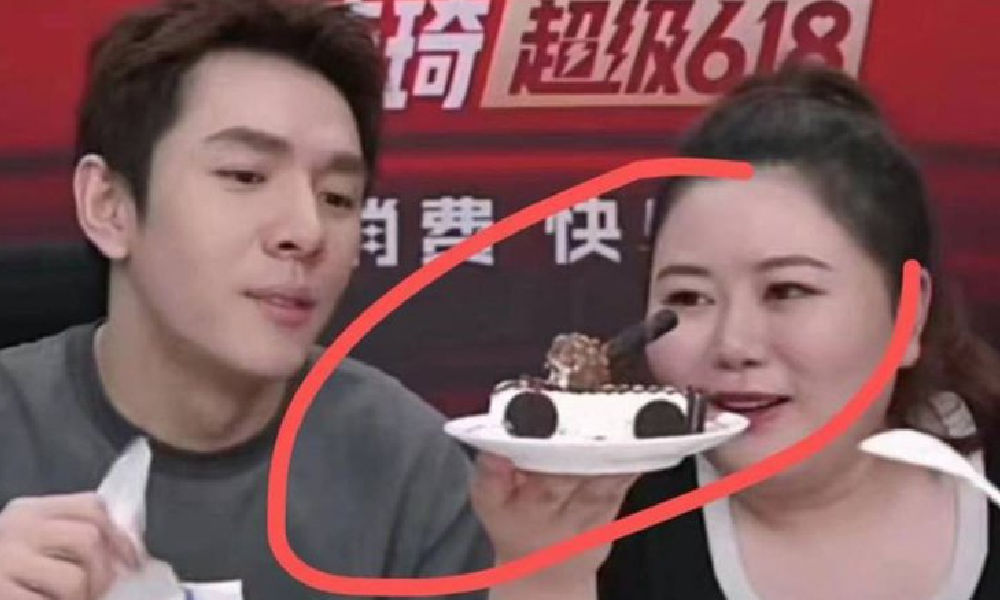
While Li Jiaqi did not directly touch upon a politically sensitive issue with his controversial livestream, his actions were perceived as a disregard for customer loyalty and displayed an arrogance inconsistent with socialist core values. This behavior garnered criticism in a recent post by the state media outlet CCTV.
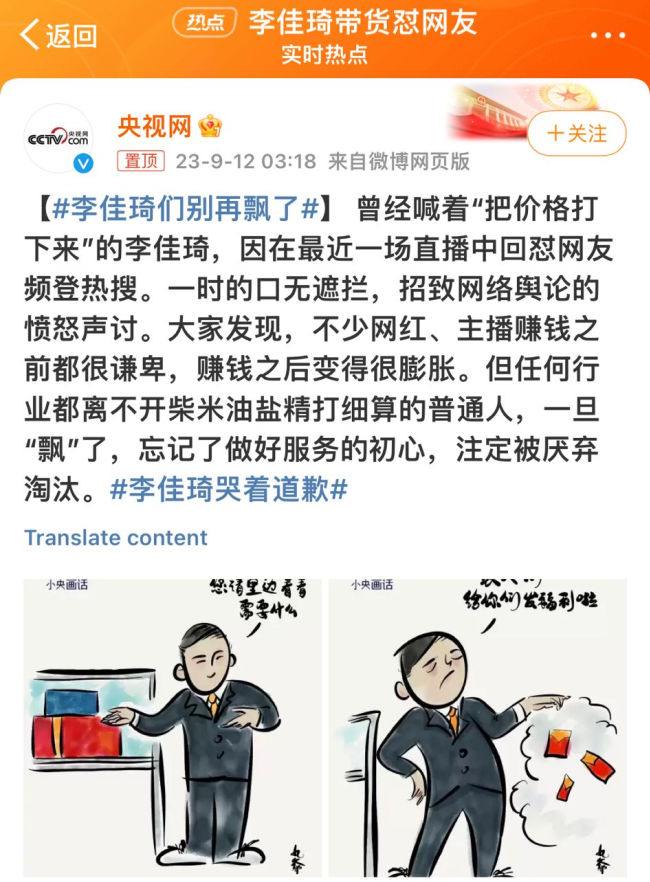
Post by CCTV condemning Li’s behavior.
Other state media outlets and official channels have joined in responding to the issue, amplifying the narrative of a conflict between the ‘common people’ and the ‘arrogant influencer.’
#3 Striking a Wrong Chord in Challenging Times
Lastly, Li Jiaqi’s controversial livestream moment also became especially big due to the specific words he said about people needing to reflect on their own work efforts if they cannot afford a $11 eyebrow pencil.
Various online discussions and some media, including CNN, are tying the backlash to young unemployment, tepid consumer spending, and the ongoing economic challenges faced by workers in China.
Since recent years, the term nèijuǎn (‘involution’, 内卷) has gained prominence when discussing the frustrations experienced by many young people in China. It serves as a concept to explain the social dynamics of China’s growing middle class who often find themselves stuck in a “rat race”; a highly competitive education and work environment, where everyone is continually intensifying their efforts to outperform one another, leading to this catch 22 situation where everyone appears to be caught in an unending cycle of exertion without substantial progress (read more here).
Weibo commenters note that, given China’s current employment situation and wage levels, hard work is not necessarily awarded with higher income. This context makes Li Jiaqi’s comments seem even more unnecessary and disconnected from the realities faced by his customers. One Shanghai surgeon responded to Li’s comments, saying that the fact that his salary has not increased over the last few year certainly is not because he is not working hard enough (#上海胸外科医生回应李佳琦言论#).
Some observers also recognize that Li, as an e-commerce professional, is, in a way, trapped in the same cycle of “inversion” where brands are continuously driving prices down to such low levels that consumers perceive it as the new normal. However, this pricing strategy may not be sustainable in the long run. (Ironically, some brands currently profiting from the controversy by promoting their own 79 yuan deals, suggesting their deal is much better than Li’s. Among them is the domestic brand Bee & Flower 蜂花, which is offering special skin care products sets for 79 yuan in light of the controversy.)
Many discussions therefore also revolve around the question of whether 79 yuan or $11 can be considered expensive for an eyebrow pencil, and opinions are divided. Some argue that people pay much more for skincare products, while others point out that if you were to weigh the actual quantity of pencil color, its price would surpass that of gold.
The incident has sparked discussions about the significance of 79 yuan in today’s times, under the hashtag “What is 79 yuan to normal people” (#79元对于普通人来说意味着什么#).
People have shared their perspectives, highlighting what this amount means in their daily lives. For some, it represents an entire day’s worth of home-cooked meals for a family. It exceeds the daily wages of certain workers, like street cleaners. Others equate it to the cost of 15 office lunches.

One netizen posts 79 yuan ($10.9) worth of groceries.
Amid all these discussions, it also becomes clear that many people are trying to live a frugal live in a time when their wages are not increasing, and that Li’s comments are just one reason to vent their frustrations about the situation they are in, In those regards, Li’s remarks really come at a wrong time, especially coming from a billionaire.
Will Li be able to continue his career after this?
Some are suggesting that it is time for Li to take some rest, speculating that Li’s behavior might stem from burn-out and mental issues. Others think that Li’s hardcore fans will remain loyal to their e-commerce idol.
For now, Li Jiaqi must tread carefully. He has already lost 1.3 million followers on his Weibo account. What’s even more challenging than regaining those one million followers is rebuilding the trust of his viewers.
Update: On September 19, the Florasis/Huaxizi brand finally apologized for its late response to the controversy, and the brand stated that the controversy provided an opportunity for them to listen to “the voice of their consumers.” Their decision to release a statement seemed fruitful: they gained 20,000 new followers in a night.
By Manya Koetse
with contributions by Miranda Barnes
Jeffreys, Elaine, and Jian Xu. 2023. “Governing China’s Celebrities.” Australian Institute of International Affairs, 18 May https://www.internationalaffairs.org.au/australianoutlook/governing-chinas-celebrities/ [12 Sep 2023].
Sullivan, Jonathan, and Séagh Kehoe. 2019. “Truth, Good and Beauty: The Politics of Celebrity in China.” The China Quarterly 237 (March): 241–256.
Spotted a mistake or want to add something? Please let us know in comments below or email us. First-time commenters, please be patient – we will have to manually approve your comment before it appears.
©2023 Whatsonweibo. All rights reserved. Do not reproduce our content without permission – you can contact us at info@whatsonweibo.com.
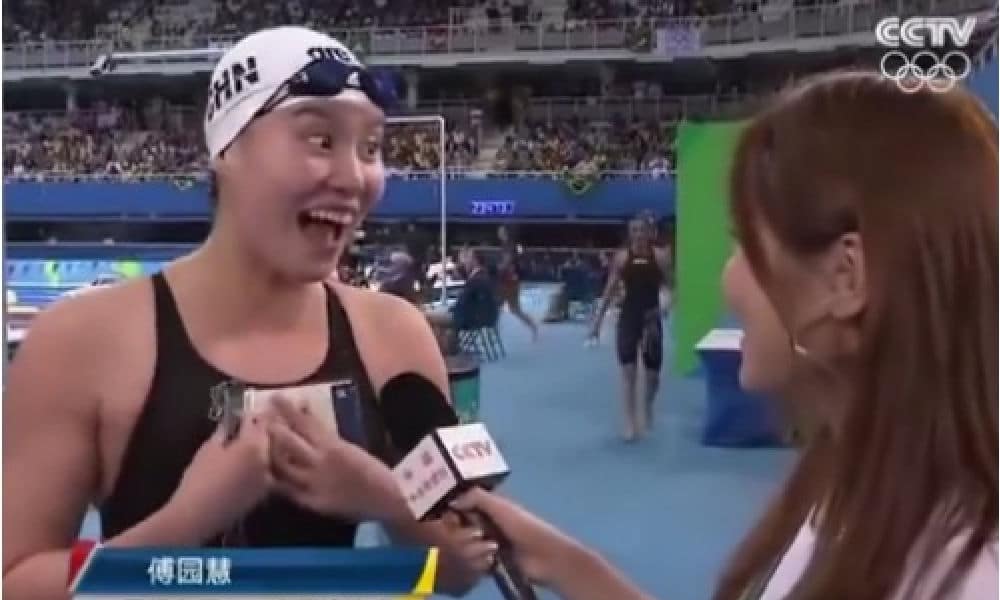

 China Insight3 months ago
China Insight3 months ago
 China Music4 months ago
China Music4 months ago
 China Digital10 months ago
China Digital10 months ago
 China Arts & Entertainment12 months ago
China Arts & Entertainment12 months ago

 “I don’t have high expectations for tomorrow, I am already very pleased!”
“I don’t have high expectations for tomorrow, I am already very pleased!” By comic author Ding Yichen (@
By comic author Ding Yichen (@ Netizens copying Fu’s facial expressions.
Netizens copying Fu’s facial expressions.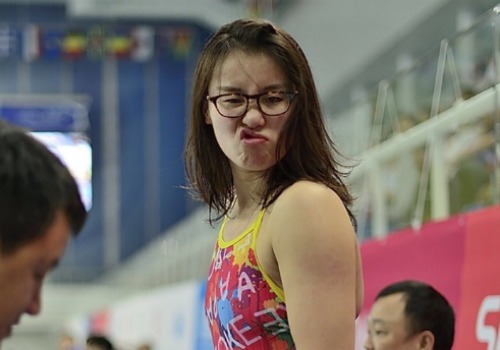
 One of the many images being shared on Weibo, saying: “I am so happy!”
One of the many images being shared on Weibo, saying: “I am so happy!”








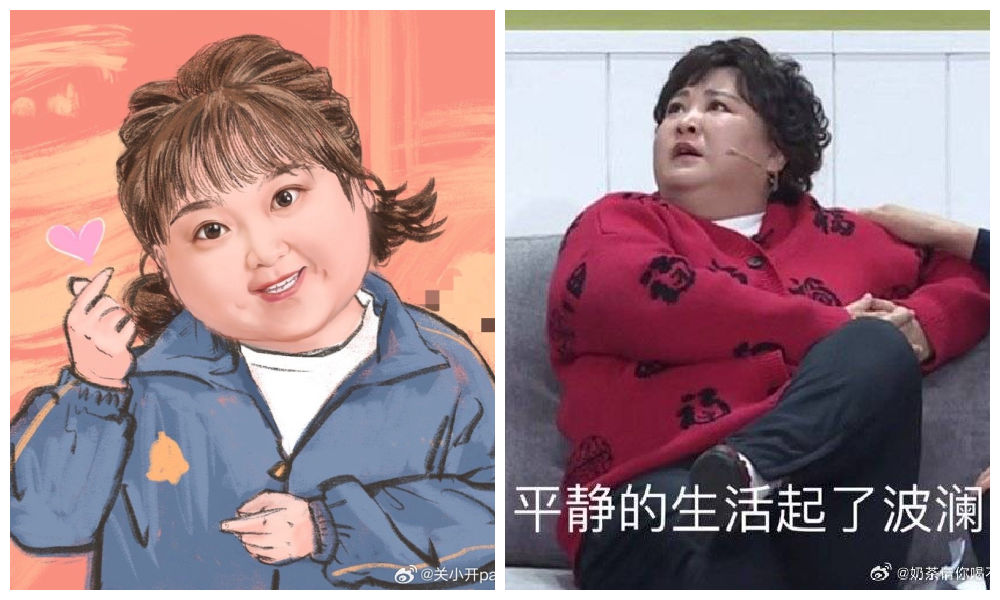
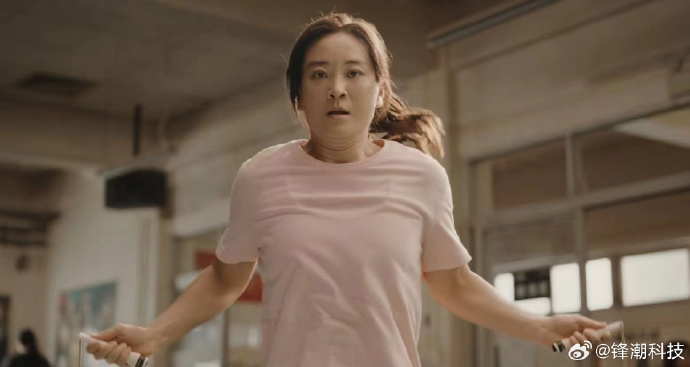
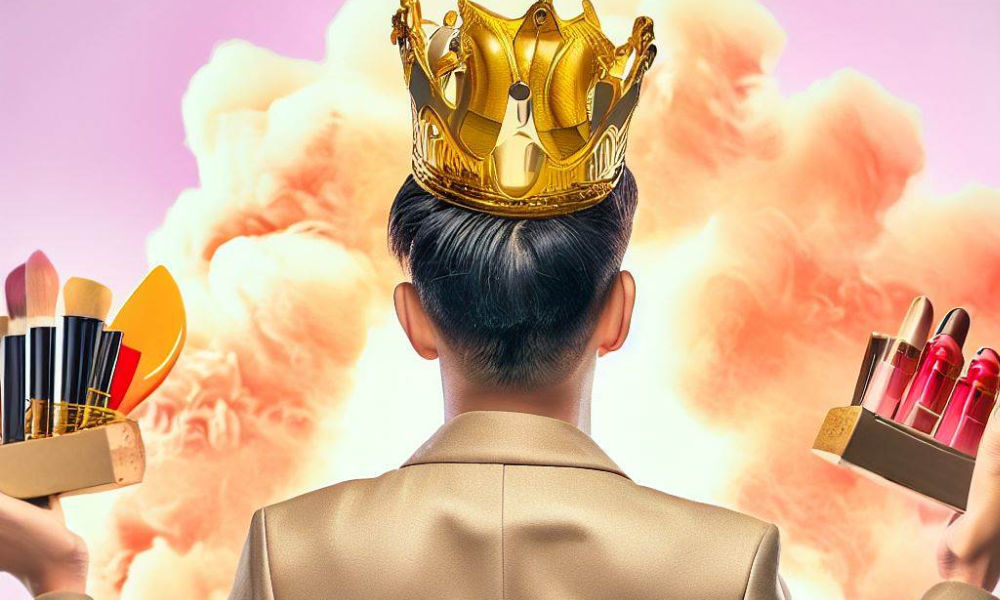

















Jesús
August 9, 2016 at 4:45 am
Wow! I didn’t knew that chinese people knew to smile, so now i got hope the Chinese will be a little more humans well, all will must to be more…
Congratulations to Fu! perhaps she isn’t the most beautifull woman in the earth, but she has a brightness that it becomes her in a very very pretty woman ^^
DON’T CHANGE NEVER FU!!!
Hi from Spain! ; ) Bye and kisses
Thomas
August 9, 2016 at 7:37 am
visit China sometime, there is a lot of smiling going on, also crying, jumping form joy and basically all emotions that you have is Spain also ;-P
Jesús
August 9, 2016 at 4:45 pm
I know XDD . Everything was an irony : P . But I do not think I ever wander through China, at least in this life because , if it costs me support to my country , I do not think I feel better surrounded by a population with so different from my culture and so hermetic mentality such as Chinese .
Sorry if my commentary is offensive for someone, it isn’t my think.
你爷爷
August 9, 2016 at 11:05 pm
fuck you, bitch, Spanish white pig. Sorry, if my commentary is offensive for someone, it isn’t my think.
chao
August 9, 2016 at 11:29 pm
you make me feel shamed…. do not be raciest, please. I believe this Mr. Jesus is a friendly guy.
Liuxing Shen
August 10, 2016 at 3:06 am
Respect personal choice!
Siline
August 10, 2016 at 11:33 am
Your reaction is quite humiliating. Please think before you post. Even if you don’t get his humor and misunderstand, an appropriate reaction will be appreciated. Especially, people might think you represent CHINESE!
joshwu
August 10, 2016 at 3:18 pm
You’re such an obscenity of Chinese nation, just go home and die quietly. You make hundreds of millions of overseas Chinese
你爷爷
August 11, 2016 at 12:42 am
I post the previous comment because I don’t take “hermetic mentality” as a compliment, neither does “surrounded by population”, also “a little more human” made me feel offended. If declaring to apologize to whom feel uncomfortable after a long paragraph of ironic saying could be taken as “friendly”, I’m also friendly due to my same sentence posted after my racism curse. And to Joshwu, if you could not express yourself in English, use the dictionary, if you are lazy, just using Chinse.
Deus Vult
August 9, 2016 at 8:19 am
gas yourself you fucking spic
Jesús
August 9, 2016 at 4:37 pm
No mereces que nadie pierda el tiempo respondiéndote…
Robert
August 10, 2016 at 2:13 am
Miss you ass,humiliate our Chinese citizen
Northest
August 9, 2016 at 7:16 am
She’s such a optimistic girl. Hope Chinese athletes can be more funny like her.
I’m from China and just saw this on Reddit. Thanks for sharing this. Good translation. 🙂
Cindy
August 9, 2016 at 8:46 am
This is adorable! I hope she does well in the finals. 🙂
xingfenzhen
August 9, 2016 at 9:02 pm
she won brozne, and she was jumping and down (and bronze and silver medalist all serious looking), so much you would have though she won gold.
Norha
August 11, 2016 at 4:42 am
haha..she really is cute, isn’t she?
sreb
August 10, 2016 at 9:03 pm
Congratulations! She’s fantastic– a genuine young athlete who did not allow the publicity and hype to go to her head. Here’s to continued success in the future.
Leonardo França Ribeiro
August 12, 2016 at 7:29 am
Todos no Brasil a amamos <3 ela é uma pessoa super Gentil, brincalhona e super simpatica, suas reações foram muito engraçadas, com certeza Fu Yuanhui sera a atleta dessas olimpiadas 2016. Esperamos ve-la com muitas medalhas de ouro, você trouxe muitas alegrias pra todos nos. beijos de todo o Brasil FU Yuanhui nós te adoramos ^^
All in Brazil love <3 she's a super person Gentle, playful and super simpatica, their reactions were very funny, certainly Fu Yuanhui will be the athlete of these Olympics 2016. We hope to see it with many gold medals, you brought many joys for all of us. kisses from all over Brazil FU Yuanhui we love you ^^
sorry English terrible but I only speak Portuguese
Jamesglype
August 25, 2017 at 3:35 pm
Новый Автоломбард на Коломенской предлагает займы практически под любые суммы,
вы получите деньги всего за 30 минут: приезжайте, и получайте!
Нужны средства на достойное проведение отпуска? Не проблема!
Всё, что для этого нужно – это Ваш паспорт, ПТС, и свидетельство о регистрации.
Выдаём суммы до трёх с половиной миллионов рублей.
Никаких бюрократических сложностей и лишних вопросов.
Мы выдаем деньги под залог автомобиля, мотоцикла, квадроцикла и других транспортных средств.
Заинтересованы?
Добро пожаловать!
http://andropova22lombard.ru